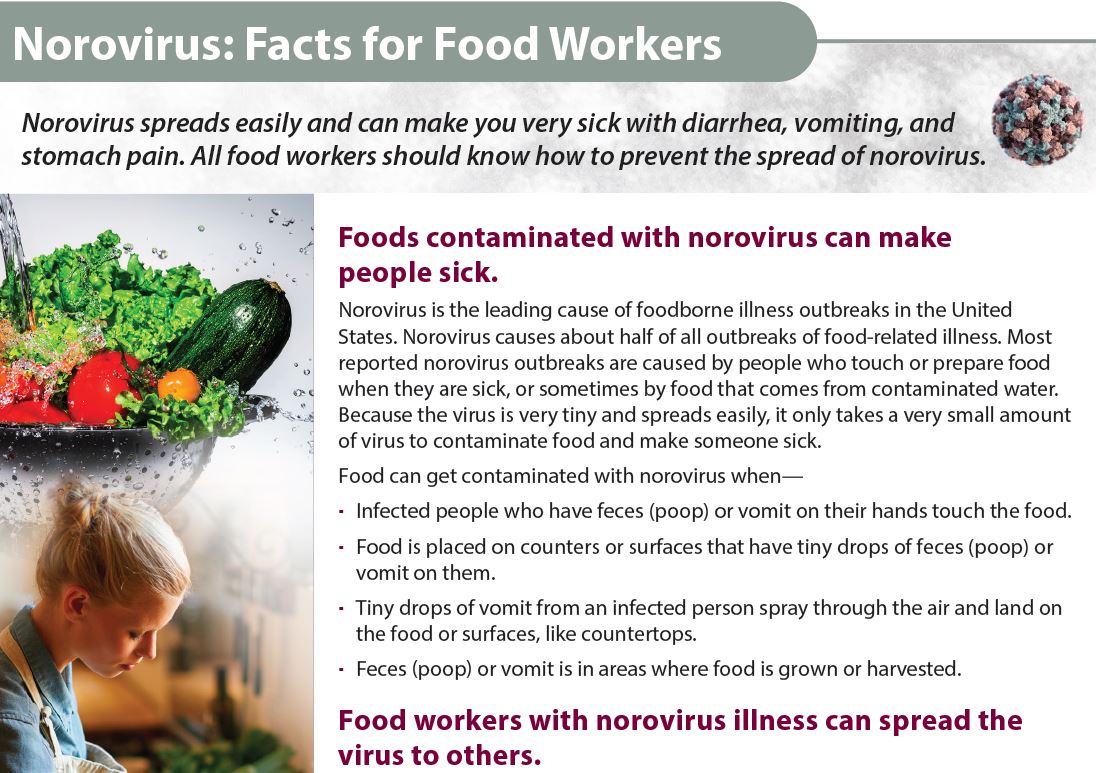- Norovirus causes about half of all outbreaks of food-related illness.
- Norovirus spreads easily and can make you very sick with diarrhea, vomiting, and stomach pain.
- All food workers should know how to prevent the spread of norovirus.
Text equivalent
Norovirus: Facts for Food Workers
Norovirus spreads easily and can make you very sick with diarrhea, vomiting, and stomach pain. All food workers should know how to prevent the spread of norovirus.
Foods contaminated with norovirus can make people sick.
Norovirus is the leading cause of foodborne illness outbreaks in the United States. Norovirus causes about half of all outbreaks of food-related illness. Most reported norovirus outbreaks are caused by people who touch or prepare food when they are sick, or sometimes by food that comes from contaminated water.
Because the virus is very tiny and spreads easily, it only takes a very small amount of virus to contaminate food and make someone sick.
Food can get contaminated with norovirus when—
- Infected people who have feces (poop) or vomit on their hands touch the food.
- Food is placed on counters or surfaces that have tiny drops of feces (poop) or vomit on them.
- Tiny drops of vomit from an infected person spray through the air and land on the food or surfaces, like countertops.
- Feces (poop) or vomit is in areas where food is grown or harvested.
Food workers with norovirus illness can spread the virus to others.
People who are infected with norovirus can shed billions of norovirus particles in their feces (poop) or vomit. You are most contagious—
- When you feel sick with norovirus, and
- During the first few days after you feel better.
If you work with food when you have norovirus, you can easily contaminate the food and drinks you touch. People who have the contaminated food or drinks you touched can also get norovirus and become sick.
Norovirus causes about half of all outbreaks of food-related illness.
Any food served raw or handled after being cooked can get contaminated with norovirus.
4 Tips to Prevent Norovirus from Spreading
1. When you are sick, do not prepare, serve, or touch food for others
Food workers should stay home when sick and for at least 48 hours after symptoms stop. This also applies to sick workers in schools, daycares, healthcare facilities, and other places where they may expose people to norovirus. Food workers should inform managers if they have any symptoms of norovirus illness or were recently sick. Even when returning to work, it is especially important that food workers continue to take precautions like frequent handwashing.
For more information, see the FDA Food Code.
2. Practice proper hand hygiene
Always wash hands carefully with soap and water, especially—
- After using the toilet and
- Before eating, preparing, or handling food.
Alcohol-based hand sanitizers can be used in addition to hand washing. However, they should not be used as a substitute for washing with soap and water. In addition, food workers should avoid touching food, especially ready-to-eat food, with bare hands, and use gloves or tongs instead. Hands should still be washed before and after use of gloves in order to prevent cross-contamination.
3. Wash fruits and vegetables and cook seafood well
Carefully wash fruits and vegetables before preparing and eating them. Cook oysters and other shellfish thoroughly before eating. Thorough cooking is important because noroviruses can survive temperatures as high as 145°F. Quick steaming processes that are often used for cooking shellfish won’t kill the virus.
Food that might be contaminated with norovirus should be thrown out.
4.Clean and disinfect contaminated surfaces
After throwing up or having diarrhea, immediately clean and disinfect contaminated surfaces like countertops. Use a chlorine bleach solution with a concentration of 1000 to 5000 ppm (5 to 25 tablespoons of household bleach [5.25%] per gallon of water) or other disinfectant registered as effective against norovirus by the Environmental Protection Agency (EPA).
See EPA’s list of registered disinfectants effective against norovirus.
What is the Right Way to Wash Your Hands?
- Wet your hands with clean, running water (warm or cold) and apply soap.
- Rub your hands together to make a lather and scrub them well; be sure to scrub the backs of your hands, between your fingers, and under your nails.
- Continue rubbing your hands for at least 20 seconds. Need a timer? Hum the “ABC” song from beginning to end twice.
- Rinse your hands w running water.
- Dry your hands using a cleantowel or air dry them.
- Use a paper towel or your elbow to open the bathroom door.
See CDC's handwashing website.
Visit CDC’s norovirus website for more information.

